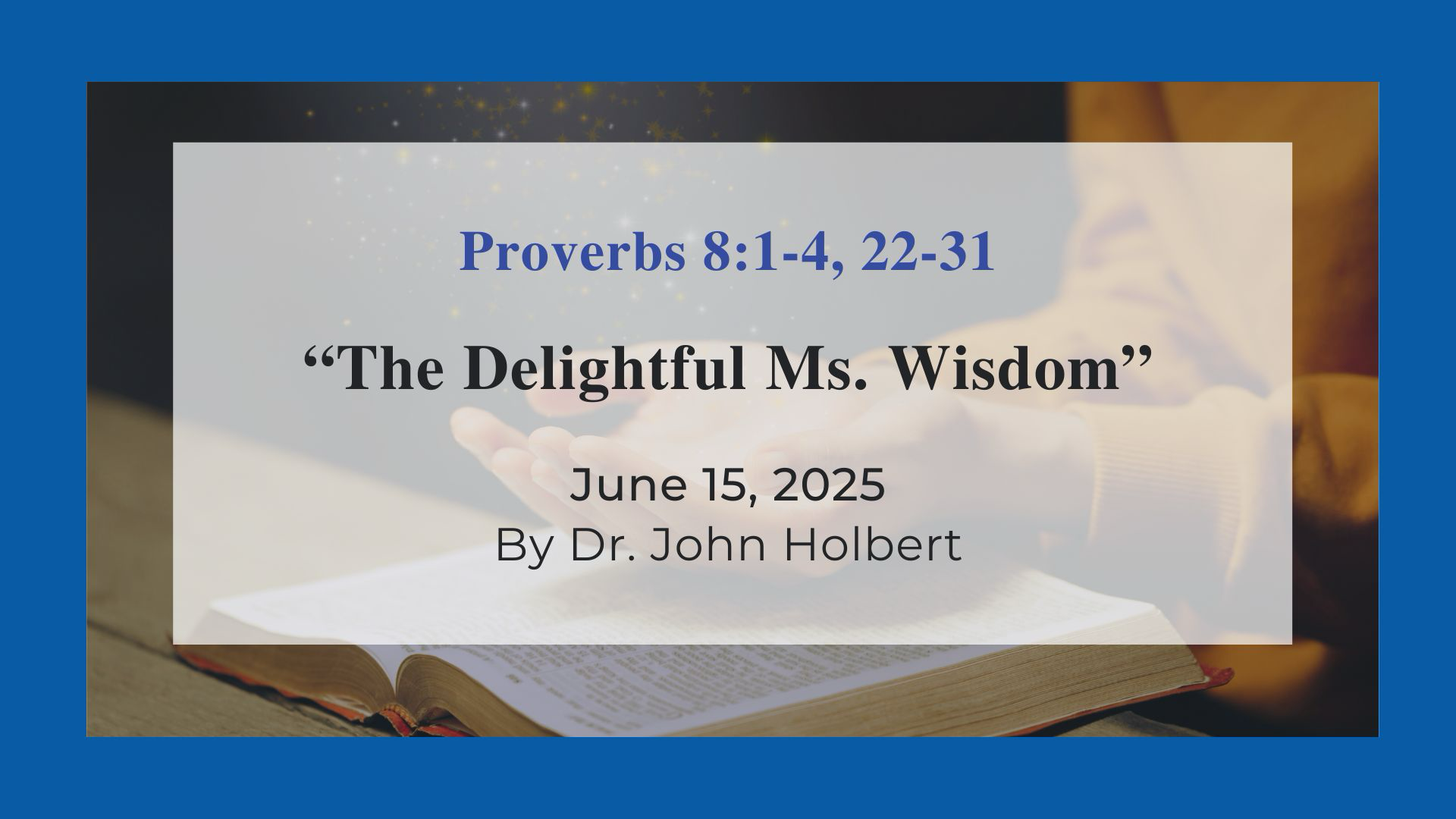The Delightful Ms. Wisdom - Reflections on Proverbs 8:1-5, 22-31, Trinity Sunday, Year C
by John C. Holbert on Thursday, May 1, 2025

We now enter that very long season of the church year that used to be known as “Ordinary Time,” or even before that “Kingdomtide,” though the lectionary I use calls it “the 24 Sundays after Pentecost.” Whatever its name, it is a nearly 1/2 year of Sundays focused on a continuous reading of texts from the Hebrew Bible, coupled with a continuous reading of one of the Gospels. This year C brings us readings from the prophets of the Hebrew Bible and seriatim readings from the Gospel of Luke. However, those series do not begin until next week, June 22, because the first Sunday after Pentecost is given over to a celebration of Trinity Sunday.
I have in other essays expressed my own dissatisfaction with the theological notion of the Trinity, but I do not intend to reiterate my problems with it here. You may judge me to be an Arian, I suppose, and if you do not know what that is, please look it up. Arius, too, questioned the emerging doctrine of the Triune God, supposedly codified by the councils of Nicea (325 CE) and Constantinople (381 CE), by suggesting that Jesus was in certain ways not “consubstantial” with God, the Father. In other words, Jesus was begotten of the Father but was not of a similar substance with the Father. I simplify, if you can believe it, but I agree that Jesus is, in the end, not made or born divine. This does Nicea term me heretic!
However, our text from Proverbs, a truly delightful and mysterious text indeed, formed the backdrop of this later trinitarian speculation, and provided a rich and imaginative look at Woman Wisdom who, we are told, was the very first being created by God (Prov.8:22). Such an idea offered a germ for the famous formulation found in John’s Gospel, which famously states, “In the beginning was the Word,” that Greek word (logos) possessing all sorts of possible meanings: “thing;” “speech;” even “God,” since John goes on to say that “the Logos was God.” (John 1:1) The idea of John’s “word” appears to grow organically out of the wonderful commentary concerning Woman Wisdom in Prov.8.
Prov.8:1-21 provides a list of the powers of Woman Wisdom, her clarity of speech, her precious words, her absolute necessity as a guide for all who would listen to her, and her gifts of material benefits to her followers. But vs.22 lifts the idea of this beneficial figure into the cosmic realm. She is now far more than a helpful leader of humanity; she now becomes, in the poet’s rich imagination, a near consort of God. Just listen to the exalted nature of this poetry:
“YHWH created me as the beginning of God’s way; the very first of the divine works of old. In a remote past I was shaped, at the start of the first things of earth” (Prov.8:22-23). The poet brings us back to the very beginning of creation, but adds that even before the “creation of the skies and the earth,” God first created Woman Wisdom. This happened, “when there were no deeps,” that is, before the creation of the vast seas; before there were “springs or any water source.” Woman Wisdom was “spawned” (or “brought forth”). “Before there were mountains fixed, before hills were shaped, I was brought forth.” The poet goes on to make it clear that Woman Wisdom was the first of all things made by YHWH.
But 8:30-31 goes farther by delineating just what Wisdom’s role is in the universe as well as with and for God. “I was for God an intimate (perhaps “a little child”); I was God’s delight day after day, playing before God at all times” (Prov.8:30). This is a charming notion! Wisdom is God’s playmate, God’s intimate friend, God’s wonderfully delightful partner in creation. One again hears echoes of John’s exalted first-chapter language: “without him (the Word) not one thing came into being.” Yet, in Proverbs, there is an astonishing playfulness in the description of Woman Wisdom, because she is found “playing in the world, in God’s earth,” possessing “my delight with humanity.” Not only does she delight in God, playing with and for God at all times, but she also takes great delight in humanity, sharing her rich self with us as Prov.8:1-4 makes plain.
I would suggest that not only does this remarkable passage serve as the underpinnning for later theological reflections about the Trinity, but it also offers to those of us who love the beauty and power of the words of Scripture something else—Wisdom is just plain fun! It may possess wonderful utility for humanity, but it also offers the pleasure of the scholar at research and the botanist at her work of the search for the beauties of nature. Wisdom is forever calling to us to “understand prudence and shrewdness,” to “listen to noble ideas,” to discern “uprightness and truth” (Prov.8:1, 5-7). Proverbs 8 is an amazing text, worth many hours of reflection, both for its own sake, but also for the sake of profound theological speculation. Once again, our Bible surprises us with wonders still to be uncovered!
